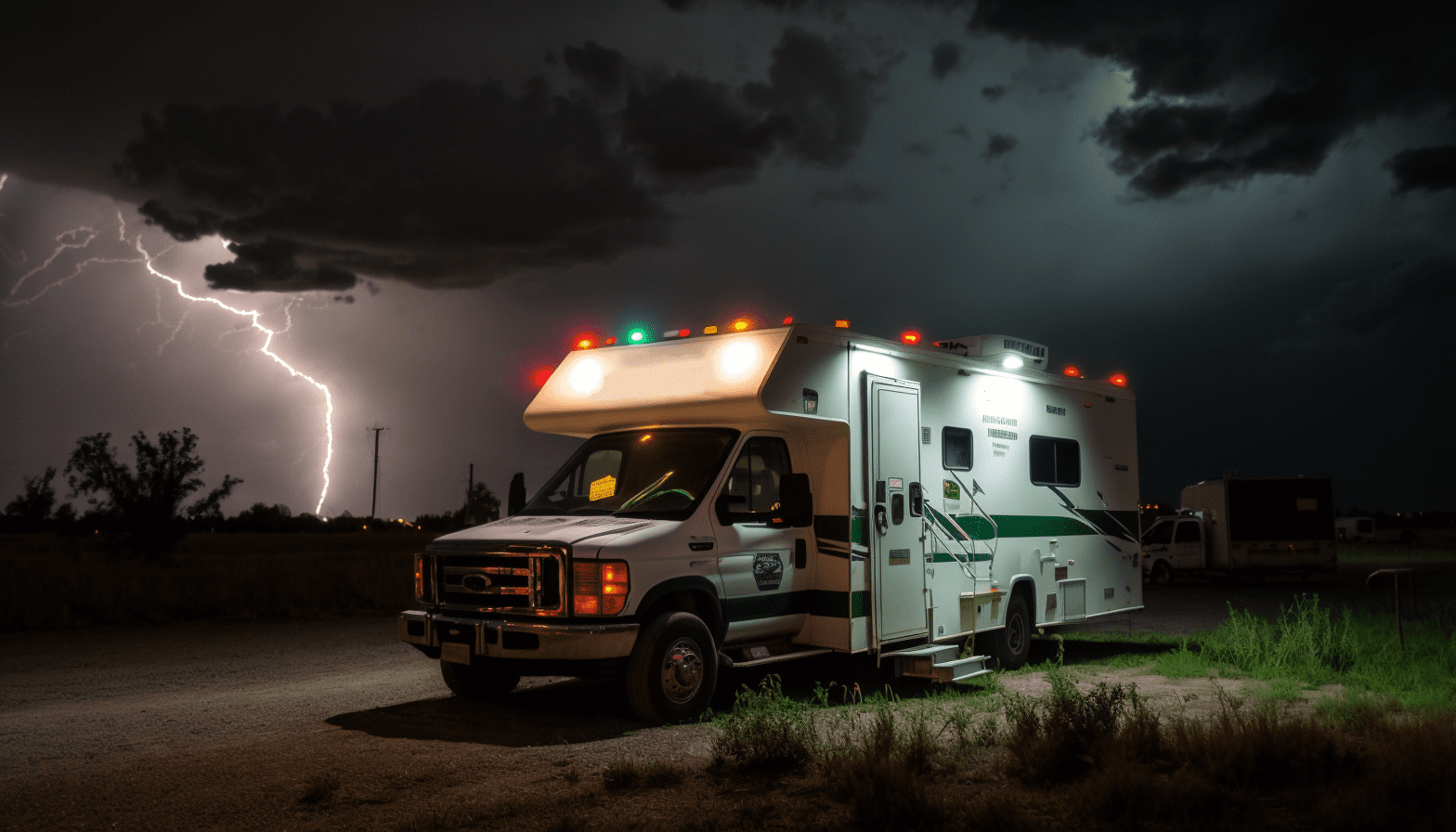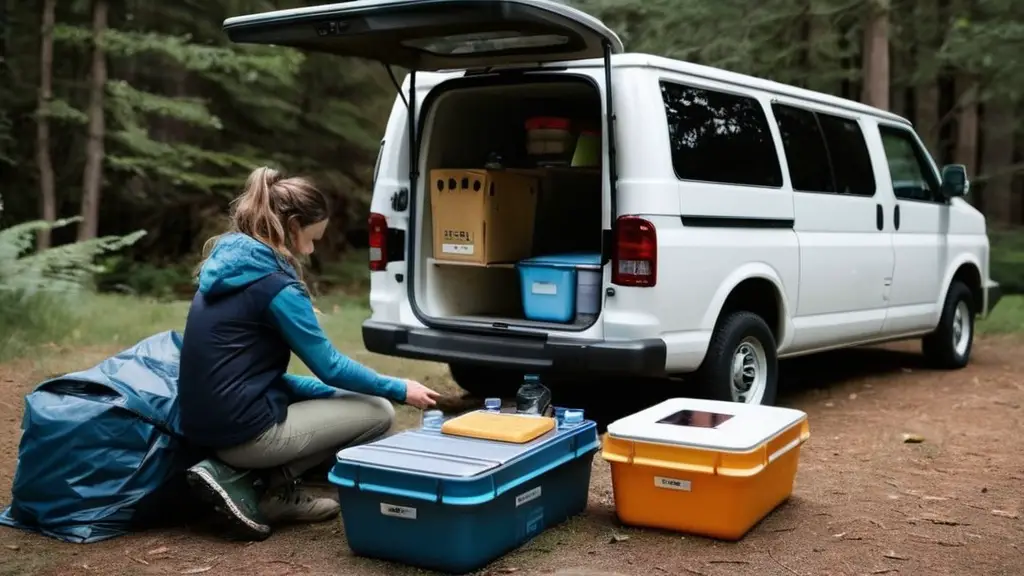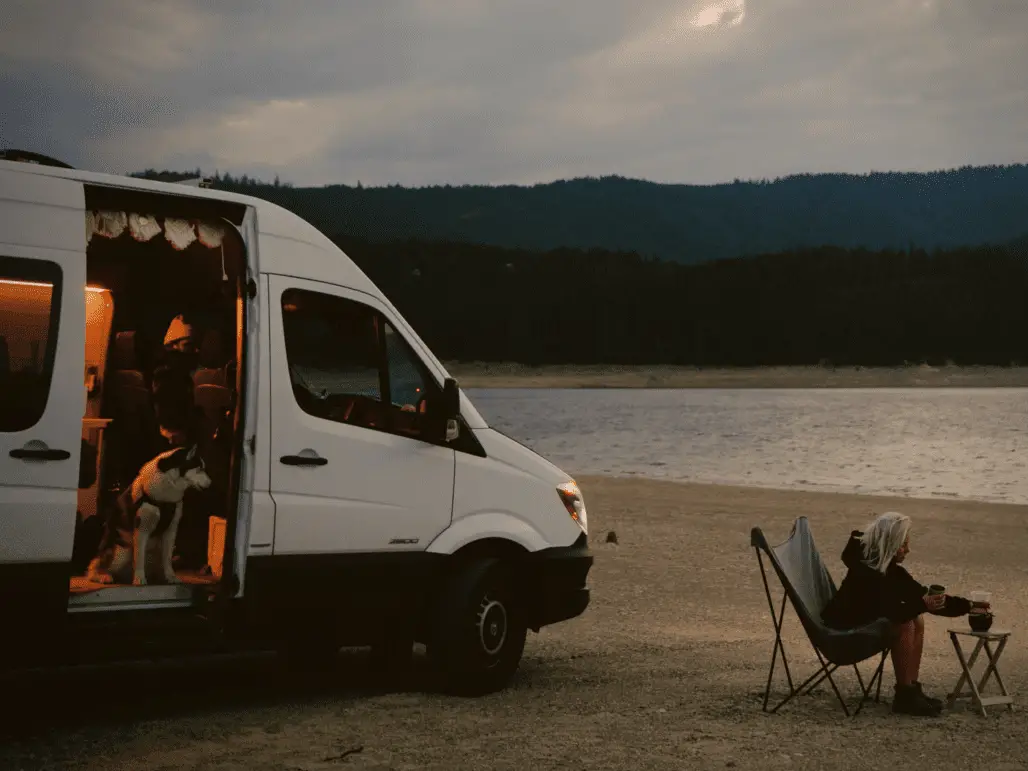When you’re out on the open road, you need to have peace of mind that your RV is protected from unexpected power surges. An RV surge protector is an essential tool for any adventurer taking their home away from home on the road. Whether you’re a full-timer or just a weekend warrior, it’s important to know the different types of RV surge protectors available and how to choose the right one for your rig.
I recorded a video (“Storm Damage To The Ambulance Conversion“) and posted it on YouTube about my experience with a voltage spike from a lightning strike, and really wished I had invested in a surge protector from the beginning. I know better now.
What Is An RV Surge Protector?
An RV surge protector is a device designed to protect electronic components and RV appliances from power surges, electrical issues, and other problems caused by the electrical management system of an RV. The portable units are designed to be plugged into a power pedestal or generator at an RV park or campsite, then plugged into your RV electrical cord. They typically feature basic surge protectors and some models come with additional features such as reverse polarity detection, amp draw protection and lifetime warranties.
An RV surge protector is essential for safeguarding your camper against electrical surges. These surges can cause irreparable damage to the RV’s electronics and appliances, whether they are part of the vehicle or connected to a 120V AC outlet.
A quality surge protector ensures your electrical system remains safe. It has the capability to switch off power from the power pedestal if any hazardous electrical event occurs. RV surge protectors are a must-have for RVers looking to keep their rigs in top condition. Camper surge protectors offer protection against dangerous situations, like electrical overloads and faulty wiring, providing peace of mind.
Investing in a high quality surge protector can mitigate potential costly damages caused by power spikes or surges to an RV. Several well-known brands, including Progressive Industries, Southwire Surge Guard and Hughes Autoformers, provide dependable protection for electronic devices. Ensure that you are aware of the amp draw of your RV before selecting a surge protector that fits all your requirements. With the right surge protector in place, you will have peace of mind knowing that your electronic devices are safe from harm during your travels.
Whether you are an experienced RVer or a beginner, investing in an RV surge protector is a wise choice that can save you time, money and headaches down the road. And with so many options available, there’s sure to be one that meets your needs—stay tuned for our next section to find out more about the different types of RV surge protectors!
Types Of RV Surge Protectors
RV surge protectors come in a variety of models and are designed to meet the needs of different RVers.
- Joules of Surge Protection: These surge protectors are rated based on the amount of energy they can absorb before failing. The higher the joules rating, the more protection the device provides. For instance, a surge protector rated at 1000 joules would provide more protection than one rated at 500 joules.
- Progressive Industries EMS Devices: EMS stands for Electrical Management System. These devices not only provide surge protection but also continuously monitor the RV’s electrical system for low/high voltage, open neutral, and other electrical issues. If a problem is detected, the EMS will automatically shut down the power to prevent damage.
- Amp Surge Protectors: These protectors are designed to handle specific amperage, such as 30 or 50 amps, which are the most common for RVs. They protect against power surges that could damage the RV’s electrical system.
- Power Supply Surge Protectors: These devices are designed to protect the RV’s power supply unit from power surges. They are often installed directly into the power supply unit and are essential for preventing damage to the RV’s electrical equipment.
- Whole Power Grid Systems: These surge protectors are designed to provide complete protection for the entire RV. They are often more expensive, but they provide the highest level of protection against power surges, voltage fluctuations, and other electrical issues.
When you’re in the market for an RV surge protector, it’s crucial to find one that caters to all your needs. Think about the electronics you want to safeguard, the amount of amps your power source is pulling, and whether a lifetime warranty is a must-have for you. Given the plethora of options available today, you’re bound to find a broad range of RV surge protectors that perfectly align with your specific needs!
Benefits Of An RV Surge Protector
Surge protectors are essential for all RV owners, as they provide protection against costly electrical damage and potential safety hazards. A surge protector helps to protect your RV’s sensitive electronics from power surges, loose connections, and other electrical issues. Portable units make it easy to protect both stationary and traveling RVs, while basic surge protectors help to prevent potential issues and the loss of thousands of dollars in equipment due to a single incident.
For more comprehensive coverage, power pedestals such as Southwire Surge Guard and Hughes Autoformers offer complete protection against damaging power spikes that could otherwise lead to extensive damage to electronic devices. By investing in an RV surge protector, you can enjoy peace of mind knowing that your valuable equipment is protected from costly electrical issues.
Hard Wired 30-Amp RV Surge Protectors
- Package Dimensions: 21.09 L x 10.59 H x 18.29 W (inches)
- Package Weight : 2.75 pounds
- Country of Origin : China

- Emergency Protection: Ensure the safety of your RV and RV appliances with auto power-off during extreme voltage fluctuat…
- Hardwired Installation: Easy to securely install anywhere in your RV and connect to your RV’s electrical system, helping…
- Convenient Remote Monitoring: Optional RVWhisper add-on enables monitoring via Wi-Fi/cellular, keeping you informed of y…

Portable RV Surge Protectors
- Offers 3,000 Joules of advanced surge protection for your coach. It features advanced circuit analysis to automatically …
- Smart Circuit Analyzer will shut down power to RV if a dangerous event occurs. An alert will be sent to your smartphone….
- Built-in 90-second Power-on delay after a fault to protect your AC unit.Complete LED Park Power Diagnostics with Wireles…
How To Choose The Right Surge Protector For Your RV
The first step in choosing a surge protector is to determine how much protection you need. Look at the number of joules of protection offered by each model and select one that meets or exceeds your power issues. Many models also offer additional features such as reverse polarity, over-voltage protection, and overheating detection.
Another factor to consider is the amperage draw of your RV’s electrical system. Make sure that the surge protector you choose can handle this draw without becoming overloaded or damaged. If you have an electric car, make sure it has its own dedicated amp surge protector so that it does not interfere with other devices in your RV.
Finally, consider whether you need a portable or built in unit. Portable units can be moved from location to location easily, while stationary units remain in place and are more suitable for permanent installations on power grids or power sources such as generators. With these tips in mind, you should have no problem finding a reliable surge protector for your RV.
Electric Management System (EMS) Vs. Basic Surge Protectors
No matter what type of RV you have, the right surge protector can ensure that your electronics are protected from unwanted power surges. With the correct information and selection criteria in mind, you can easily choose the best option for your needs. But don’t forget to weigh the pros and cons of an Electric Management System (EMS) versus a Basic Surge Protector – we’ll dive into this more in the next article!
When it comes to protecting your RV from power surges, there are two main options: Electric Management System (EMS) and Basic Surge Protector. Both of these have their advantages and disadvantages, so it is important to understand the differences before making a decision.
An EMS provides protection against both power surges and loose connections. It also monitors the amp draw of connected devices and can shut down the power supply if necessary. This is especially useful in larger RVs with multiple electronic devices, as they require more protection than smaller units. The downside is that an EMS can be costly and complex to install, requiring special wiring or adapters for setup.
Basic surge protectors provide basic protection against unwanted power surges but do not offer any other features, such as amp draw monitoring or loose connection detection. These are much simpler to install and tend to be more affordable than an EMS. However, they may not be enough if you have several electronic devices in your RV that require more robust protection than what a basic surge protector can provide.
In short, both EMS and Basic Surge Protectors can help protect your RV from power surges – however, it is important to consider your specific needs before investing in either one.
Power Source & Pedestals: Knowing What You’re Plugging Into
RV owners should be aware of the power sources and pedestals they are plugging into when setting up camp. Knowing what type of power source you are connecting to is crucial for ensuring your RV has the correct voltage and amperage to stay powered safely. It’s also important to make sure that the power source has a surge protector in place, as even small electrical surges can cause thousands of dollars in damage.
For RVs with 30 amp service, there are portable surge protectors available that can be easily attached to an RV’s power cord before plugging it into the power pedestal. These units are designed to protect against reverse polarity, open grounds and surges up to 6,000 volts or 2,750 joules of protection.
For those with 50 amp service, there are more powerful surge protectors such as Progressive Industries EMS-PT30C or Southwire Surge Guard models that provide enhanced protection against a variety of electrical issues. Additionally, Hughes Autoformers offer 50 amp protection along with voltage regulation capabilities.
No matter what type of power source you’re plugging into at your campsite, it’s important to make sure that your RV is properly protected from any potential electrical issues – otherwise you could end up facing costly repairs down the road!
Joules Of Protection & Amps Of Draw
When selecting a surge protector for your RV, it’s crucial to take into account both the Joules of Protection and Amps of Draw. The term Joules of Protection indicates how much energy the surge protector can handle before failing. This is typically quantified in thousands of volts, or joules. The higher the value, the more your RV is safeguarded against power surges.
Amps of Draw refers to how much electricity your RV draws when plugged into a power source. It’s important to make sure you have a surge protector that can handle the amount of amps being drawn from your RV, otherwise you could end up with an overload or short circuit which can lead to costly repairs down the road. It’s also important to note that some surge protectors are only compatible with certain types of RVs so make sure you read all instructions carefully before making a purchase.
Reverse Polarity & Other Important Features To Consider
When shopping for an RV surge protector, it is important to consider the features that can provide you with the best protection possible. Reverse polarity is one such feature. This indicates whether or not the power pedestal is providing your RV with proper electrical power and can prevent you from experiencing blown fuses, loose connections, and other electrical issues. Some of the higher-end surge protectors will also have built-in voltage monitors that will alert you if there’s an issue with the power supply.
Another important feature to look for in a surge protector is a high joules of protection rating. This number tells you how much energy the device can absorb before it fails, which can save you thousands of dollars in repair costs if an electrical surge occurs. Additionally, some models come with lifetime warranties so make sure to check for that when making your purchase as well. Lastly, it’s always a good idea to invest in a unit that has ample amps of draw – this will ensure that your RV’s electronics are protected while drawing enough electricity from the power source without overloading it.
Portable Units Vs. Hardwired Units
When it comes to protecting your RV from power surges, portable surge protectors and hardwired units are the two main options. Portable units are great for those who are often on the move, as they can easily be moved from one power source to another. They also typically offer higher levels of protection than hardwired units and come with a wide range of features such as reverse polarity protection, adjustable voltage settings, and joules of protection.
Hardwired surge protectors offer superior protection compared to portable units as they are installed directly into a power pedestal or outlet, providing continuous monitoring and protection against surges. While they may cost more initially than a portable unit, they can save you thousands of dollars in the long run by protecting your expensive electronics from electrical damage.
When deciding which type is best for you, consider factors such as how often you plan to move your RV, the cost of installation (if necessary), and how much coverage is needed to adequately protect your equipment. With the right surge protector in place, you can enjoy peace of mind knowing that your RV is protected from power surges and other electrical issues.
Progressive Industries EMS & Southwire Surge Guard Models
When it comes to protecting your RV from power surges, Progressive Industries EMS and Southwire Surge Guard models are two of the top rated surge protectors on the market. These state-of-the-art units offer superior protection for your electronic devices, helping to ensure that they remain safe and secure even in the roughest conditions.
Both models feature joules of protection that can guard against even the largest spikes in electrical power supply, as well as adjustable voltage settings and reverse polarity protection to prevent damage caused by loose connections in the power grid. Additionally, both models come with a lifetime warranty so you can rest assured that your investment is protected for years to come. Whether traveling around the country or simply parked at an RV park, these reliable surge protectors will help keep your electronics safe and secure.
Portable Hughes Autoformers Models & Others
Portable Hughes Autoformers models are some of the most advanced portable surge protectors available today. These powerful units are designed to provide superior protection from electrical surges, as well as basic surge protection from power sources such as power pedestals and campground outlets. The Hughes Autoformers models are capable of handling up to 30amp draw and can help protect your expensive electronics from thousands of dollars worth of damage.
Additionally, these models feature adjustable voltage settings so you can tailor the unit to meet your specific needs, along with reverse polarity protection that helps prevent damage caused by loose connections in the power grid. Whether traveling or parked at an RV park, a Hughes Autoformer model is sure to keep your electronics safe and secure no matter what kind of electrical issue arises.
Conclusion
RV surge protectors are a must-have for any RV enthusiast. Not only can they help prevent damage to your valuable electronics and appliances, but they can also save you thousands of dollars in repair costs. When choosing an RV surge protector, it’s important to consider the type of protection you need and the size of your unit.
Portable models such as the Hughes Autoformer are ideal for those who don’t want to invest in a permanent solution, while more advanced electrical management systems from Progressive Industries provide comprehensive protection against power surges and voltage fluctuations. Whichever option you choose, installing a quality surge protector is essential for protecting your RV and keeping it running smoothly.
No matter what your RVing needs may be, investing in a quality surge protector is essential for keeping your valuable electronics and appliances safe. With so many options available on the market, it can be hard to decide which one is best for your situation – but fear not! The next section will give you all the information you need to make an informed choice.






